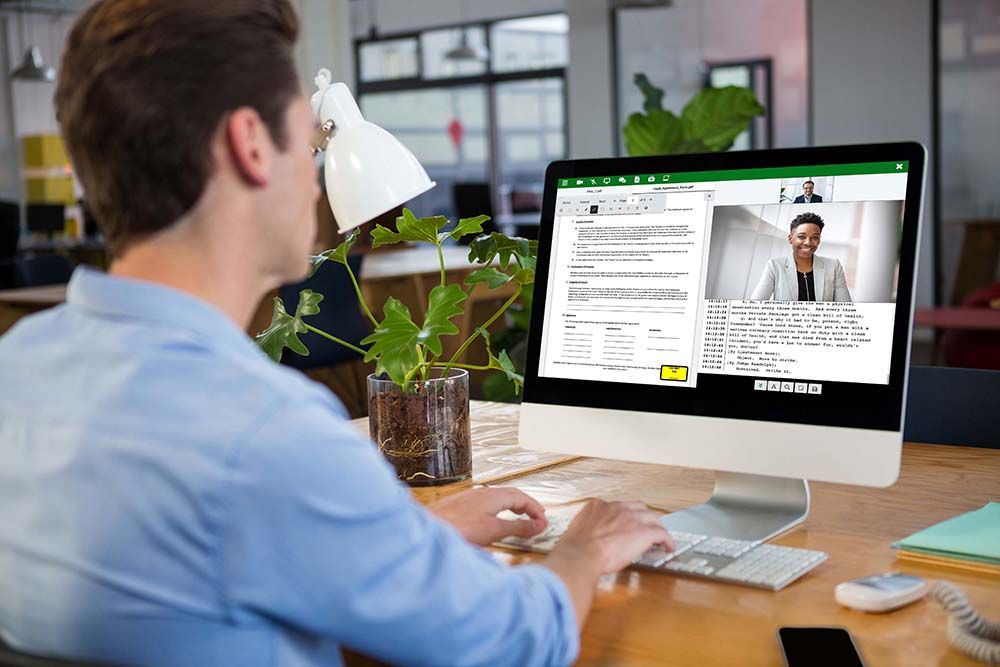Important Tips for Effective Remote Depositions all the same
Important Tips for Effective Remote Depositions all the same
Blog Article
Browsing the Future of Legal Process With Seamless Remote Depositions Solutions
As technology proceeds to advancement, the assimilation of smooth options for remote depositions has come to be critical for lawful specialists looking for efficient and economical ways to conduct depositions. By discovering the ins and outs of browsing the future of lawful process with seamless remote deposition services, a more clear understanding of the possibilities and complexities that lie ahead can be obtained.
The Increase of Remote Depositions
This shift has actually been mainly driven by the requirement for versatility, performance, and cost-effectiveness in legal process (REMOTE DEPOSITIONS). Remote depositions permit lawyers, witnesses, and court reporters to get involved from various locations, getting rid of the demand for physical presence in a specific deposition space.
Additionally, the developments in video clip conferencing systems and digital devices have enhanced the total experience of remote depositions, making sure clear audio-visual communication and safe and secure documents of statements. Lawyers currently have the choice to effortlessly arrange, document, and transcribe depositions with convenience, simplifying the whole procedure.
As modern technology remains to advance, remote depositions are anticipated to become much more prevalent in the legal sector, using a convenient and effective solution for performing depositions in a busy and interconnected globe. (REMOTE DEPOSITIONS)
Benefits of Seamless Modern Technology Integration
How does seamless technology combination boost the performance and efficiency of remote depositions in the legal industry? Smooth innovation integration plays a crucial role in improving remote depositions, providing a myriad of benefits to lawyers. By flawlessly integrating modern technology right into the deposition procedure, attorneys can conduct depositions easily, despite the individuals' physical areas. This combination enables real-time communication, file sharing, and collaboration, promoting a much more effective and effective deposition experience.
In addition, seamless technology integration enables protected and trustworthy information transmission, guaranteeing that delicate information shared during depositions is safeguarded. Advanced features such as online exhibitions, electronic signatures, and video conferencing improve the overall effectiveness of remote depositions, simulating the in-person experience with included ease. In addition, the integration of transcription services and AI-powered tools can better streamline the deposition process, conserving time and minimizing the margin of error.

Conquering Obstacles in Online Procedures
To successfully navigate virtual proceedings, lawful professionals need to resolve and get rid of various challenges that emerge in the digital environment. One of the primary obstacles dealt with in this hyperlink online process is guaranteeing secure communication and information defense. With sensitive details being shared online, maintaining customer confidentiality and avoiding information violations is critical. In addition, technological difficulties such as bad internet connection or audio/video concerns can interfere with the circulation of proceedings and influence the top quality of communications in between individuals. Attorneys find out here now need to additionally adapt to the absence of physical presence, which can impede non-verbal signs and communication nuances vital in lawful contexts. Additionally, preserving engagement and focus in virtual setups can be challenging for both lawful groups and witnesses, potentially affecting the effectiveness of the procedures. To reduce these obstacles, lawyers should purchase reputable modern technology, develop clear methods for digital process, give training on digital rules, and ensure backup plans are in area to resolve technological problems promptly. By proactively resolving these obstacles, attorneys can boost the effectiveness and efficiency of digital proceedings.
Ensuring Safety And Security and Conformity Actions
In the world of legal process, securing safety and security and making certain conformity measures is of vital value for maintaining trust fund and upholding the stability of the procedure. With the change towards remote depositions, guaranteeing the safety and discretion of sensitive information exchanged throughout these proceedings is crucial. To accomplish this, lawyers should take advantage of safeguard online systems that use end-to-end encryption, protected accessibility controls, and compliance with market laws such as HIPAA and GDPR.

Future Trends in Legal Tech Assimilation
As the legal landscape proceeds to advance with remote deposition remedies emphasizing safety and conformity, the combination of cutting-edge legal modern technologies is poised to shape future patterns in the lawful industry. AI-powered tools can help in lawful study, contract evaluation, and even forecasting case results based on historical information.
Additionally, cloud-based remedies are becoming increasingly prominent in the legal industry. Cloud innovation supplies boosted adaptability, scalability, and access, enabling lawyers to work collaboratively from anywhere with a web link. This fad not only improves performance but also promotes cost-effectiveness by minimizing the requirement for physical framework and upkeep.
Additionally, blockchain innovation is making its method right into legal tech integration, providing safe and transparent means to handle sensitive information, enhance transactions, and validate the credibility of legal files. By embracing these future trends in lawful technology integration, legislation companies can remain ahead of the curve, improve customer service, and adjust to the transforming demands of the industry.
Conclusion
In conclusion, the integration of seamless remote deposition services has actually changed legal process by supplying many advantages such as increased efficiency, cost-effectiveness, and availability. Despite encountering challenges in virtual procedures, improvements in technology remain to address security and conformity concerns (REMOTE DEPOSITIONS). As the lawful sector welcomes more assimilation of technology, future trends direct in the direction of a more structured and effective lawful process
Report this page